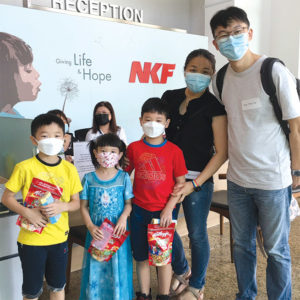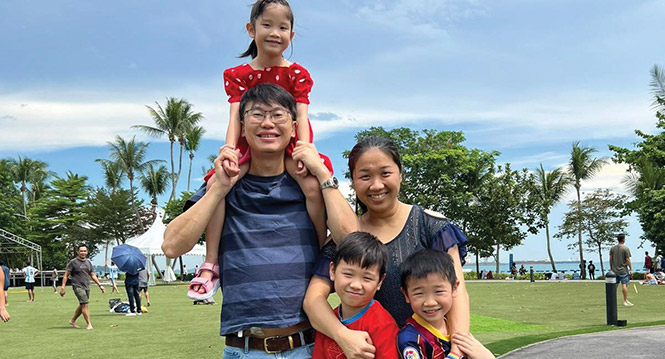
Thirty-six-year-old Puah Sheng Yee is happily married, holds a steady day job as an engineer, is blessed with three young, schoolgoing children and spends quality time with his wife and children when he is not at work.
As part of his daily routine when he comes home from work in the evenings, he helps to take care of his children – aged six, seven and nine – as his wife is also working full-time. He feeds his youngest child dinner, teaches his three children English and Science, helps them with their homework and plays with them before tucking them in. Weekends are spent taking them to their tuition classes and bringing the family on outings such as to Gardens by the Bay or the beach. During the school breaks, he takes the family on holiday to Malaysia. He also takes on the role of a caregiver by helping to look after his aged father-in-law who lives with them.
“There’s nothing to be scared about when you have kidney failure. You can live well on dialysis and have a fulfilling life.”
– Sheng Yee, who reassures newly diagnosed kidney failure patients that they can lead purposeful and meaningful lives while on lifelong dialysis.
Having an inherited disease
For Sheng Yee, he is just living a simple, normal and happy life with his family, one that he finds fulfilling and does not take for granted. And if you were to meet him, you would not be able to tell that this young, family man is, in fact, living with a life-threatening disease – kidney failure. He was diagnosed with this condition in early 2022 due to an inherited disease known as Alport syndrome, which means it is passed down through families. It is a disease that damages the tiny blood vessels in the kidneys, which can lead to kidney disease and kidney failure. It causes damage to the kidneys by attacking the glomeruli, which are tiny filtering units inside the kidneys. Sheng Yee’s younger brother is also afflicted with kidney failure.
Choosing home-based dialysis without hesitation
At the time of his diagnosis, the kidney specialist at the hospital laid down to Sheng Yee the benefits of the two dialysis treatment modalities that he was medically suited for. One was home-based peritoneal dialysis (PD) and the other was haemodialysis (HD), which is done in-centre at a community-based dialysis centre. It did not take long for Sheng Yee to make up his mind. He chose PD as he could carry out 10 hours of treatment at home while he sleeps at night, hence there is no disruption to his lifestyle, especially his 8.30am to 5.30pm job. Taking up HD would mean that he would have to travel to a dialysis centre for thrice-weekly treatment during the day, four hours each time, which would affect his work schedule.
Before Sheng Yee started his home-based dialysis treatment in April last year, he and his wife attended training sessions at the hospital to learn how to set up and carry out the procedure. Since then, it has been smooth sailing. He has been doing it independently and with ease, with his wife ready to help should he need assistance.
Sheng Yee is also able to do another form of PD, which can be carried out during the day while he is on the go. This is done – typically four times a day for about 30 minutes each time – without being hooked up to a machine by using the PD bag system, aided by gravity. He does this type of treatment conveniently without any hassles when he drives up to Malaysia as he only needs to bring along the PD solution with him. In fact, his employer has been very supportive of him, even offering to let him use the nursing room in the office should he chooses to do this form of PD. They also give him time off whenever he has medical appointments.
PD Support Group
 Sheng Yee is actively involved in NKF’s PD Support Group, which helps equip patients with better health literacy and alleviate their psychosocial and emotional burdens. It is a platform for members to share their challenges, joys and aspirations, and encourage each other in their rehabilitation journey. During the sessions, Sheng Yee shares his experiences of living and coping with kidney failure. He exudes confidence and positive energy to motivate them to stay strong and not give up when the going gets tough. He even brings his wife and children along whenever he can, which is a testament of the integral role his family plays as a support unit in his road to rehabilitation. Sheng Yee tells newly diagnosed patients, “There’s nothing to be scared about when you have kidney failure. You can live well on dialysis and have a fulfilling life.”
Sheng Yee is actively involved in NKF’s PD Support Group, which helps equip patients with better health literacy and alleviate their psychosocial and emotional burdens. It is a platform for members to share their challenges, joys and aspirations, and encourage each other in their rehabilitation journey. During the sessions, Sheng Yee shares his experiences of living and coping with kidney failure. He exudes confidence and positive energy to motivate them to stay strong and not give up when the going gets tough. He even brings his wife and children along whenever he can, which is a testament of the integral role his family plays as a support unit in his road to rehabilitation. Sheng Yee tells newly diagnosed patients, “There’s nothing to be scared about when you have kidney failure. You can live well on dialysis and have a fulfilling life.”
For Sheng Yee, he says that he cherishes the life he has as part of a young family and that he couldn’t ask for more.






